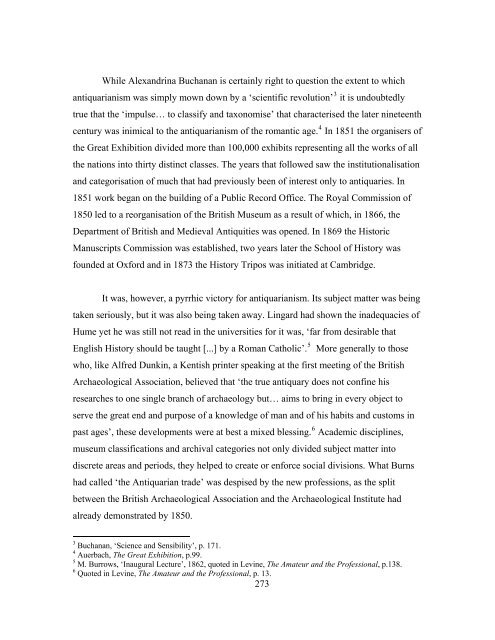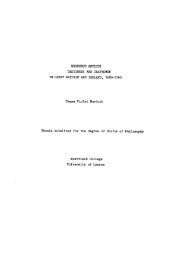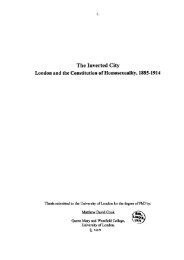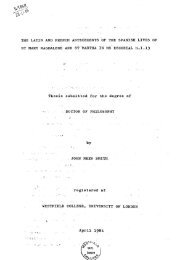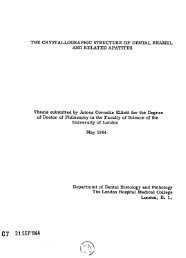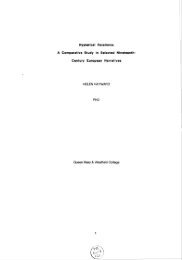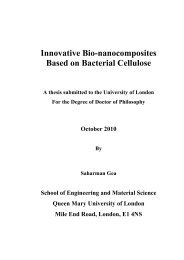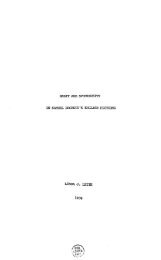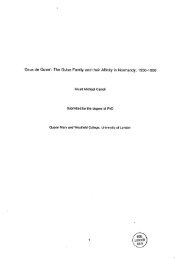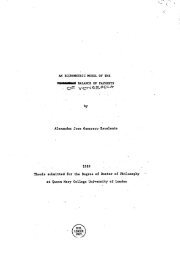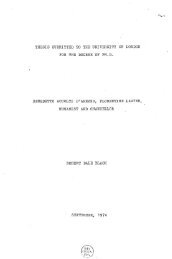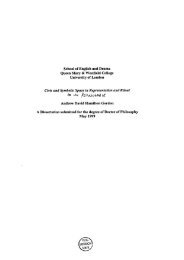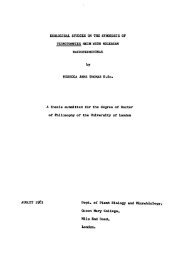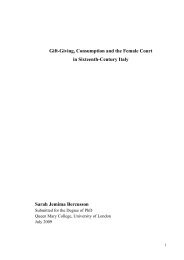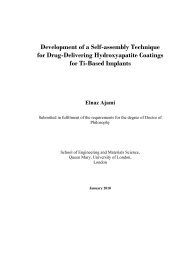Antiquaries in the Age of Romanticism: 1789-1851 - Queen Mary ...
Antiquaries in the Age of Romanticism: 1789-1851 - Queen Mary ...
Antiquaries in the Age of Romanticism: 1789-1851 - Queen Mary ...
Create successful ePaper yourself
Turn your PDF publications into a flip-book with our unique Google optimized e-Paper software.
While Alexandr<strong>in</strong>a Buchanan is certa<strong>in</strong>ly right to question <strong>the</strong> extent to which<br />
antiquarianism was simply mown down by a ‘scientific revolution’ 3 it is undoubtedly<br />
true that <strong>the</strong> ‘impulse… to classify and taxonomise’ that characterised <strong>the</strong> later n<strong>in</strong>eteenth<br />
century was <strong>in</strong>imical to <strong>the</strong> antiquarianism <strong>of</strong> <strong>the</strong> romantic age. 4 In <strong>1851</strong> <strong>the</strong> organisers <strong>of</strong><br />
<strong>the</strong> Great Exhibition divided more than 100,000 exhibits represent<strong>in</strong>g all <strong>the</strong> works <strong>of</strong> all<br />
<strong>the</strong> nations <strong>in</strong>to thirty dist<strong>in</strong>ct classes. The years that followed saw <strong>the</strong> <strong>in</strong>stitutionalisation<br />
and categorisation <strong>of</strong> much that had previously been <strong>of</strong> <strong>in</strong>terest only to antiquaries. In<br />
<strong>1851</strong> work began on <strong>the</strong> build<strong>in</strong>g <strong>of</strong> a Public Record Office. The Royal Commission <strong>of</strong><br />
1850 led to a reorganisation <strong>of</strong> <strong>the</strong> British Museum as a result <strong>of</strong> which, <strong>in</strong> 1866, <strong>the</strong><br />
Department <strong>of</strong> British and Medieval Antiquities was opened. In 1869 <strong>the</strong> Historic<br />
Manuscripts Commission was established, two years later <strong>the</strong> School <strong>of</strong> History was<br />
founded at Oxford and <strong>in</strong> 1873 <strong>the</strong> History Tripos was <strong>in</strong>itiated at Cambridge.<br />
It was, however, a pyrrhic victory for antiquarianism. Its subject matter was be<strong>in</strong>g<br />
taken seriously, but it was also be<strong>in</strong>g taken away. L<strong>in</strong>gard had shown <strong>the</strong> <strong>in</strong>adequacies <strong>of</strong><br />
Hume yet he was still not read <strong>in</strong> <strong>the</strong> universities for it was, ‘far from desirable that<br />
English History should be taught [...] by a Roman Catholic’. 5 More generally to those<br />
who, like Alfred Dunk<strong>in</strong>, a Kentish pr<strong>in</strong>ter speak<strong>in</strong>g at <strong>the</strong> first meet<strong>in</strong>g <strong>of</strong> <strong>the</strong> British<br />
Archaeological Association, believed that ‘<strong>the</strong> true antiquary does not conf<strong>in</strong>e his<br />
researches to one s<strong>in</strong>gle branch <strong>of</strong> archaeology but… aims to br<strong>in</strong>g <strong>in</strong> every object to<br />
serve <strong>the</strong> great end and purpose <strong>of</strong> a knowledge <strong>of</strong> man and <strong>of</strong> his habits and customs <strong>in</strong><br />
past ages’, <strong>the</strong>se developments were at best a mixed bless<strong>in</strong>g. 6 Academic discipl<strong>in</strong>es,<br />
museum classifications and archival categories not only divided subject matter <strong>in</strong>to<br />
discrete areas and periods, <strong>the</strong>y helped to create or enforce social divisions. What Burns<br />
had called ‘<strong>the</strong> Antiquarian trade’ was despised by <strong>the</strong> new pr<strong>of</strong>essions, as <strong>the</strong> split<br />
between <strong>the</strong> British Archaeological Association and <strong>the</strong> Archaeological Institute had<br />
already demonstrated by 1850.<br />
3<br />
Buchanan, ‘Science and Sensibility’, p. 171.<br />
4<br />
Auerbach, The Great Exhibition, p.99.<br />
5<br />
M. Burrows, ‘Inaugural Lecture’, 1862, quoted <strong>in</strong> Lev<strong>in</strong>e, The Amateur and <strong>the</strong> Pr<strong>of</strong>essional, p.138.<br />
6<br />
Quoted <strong>in</strong> Lev<strong>in</strong>e, The Amateur and <strong>the</strong> Pr<strong>of</strong>essional, p. 13.<br />
273


